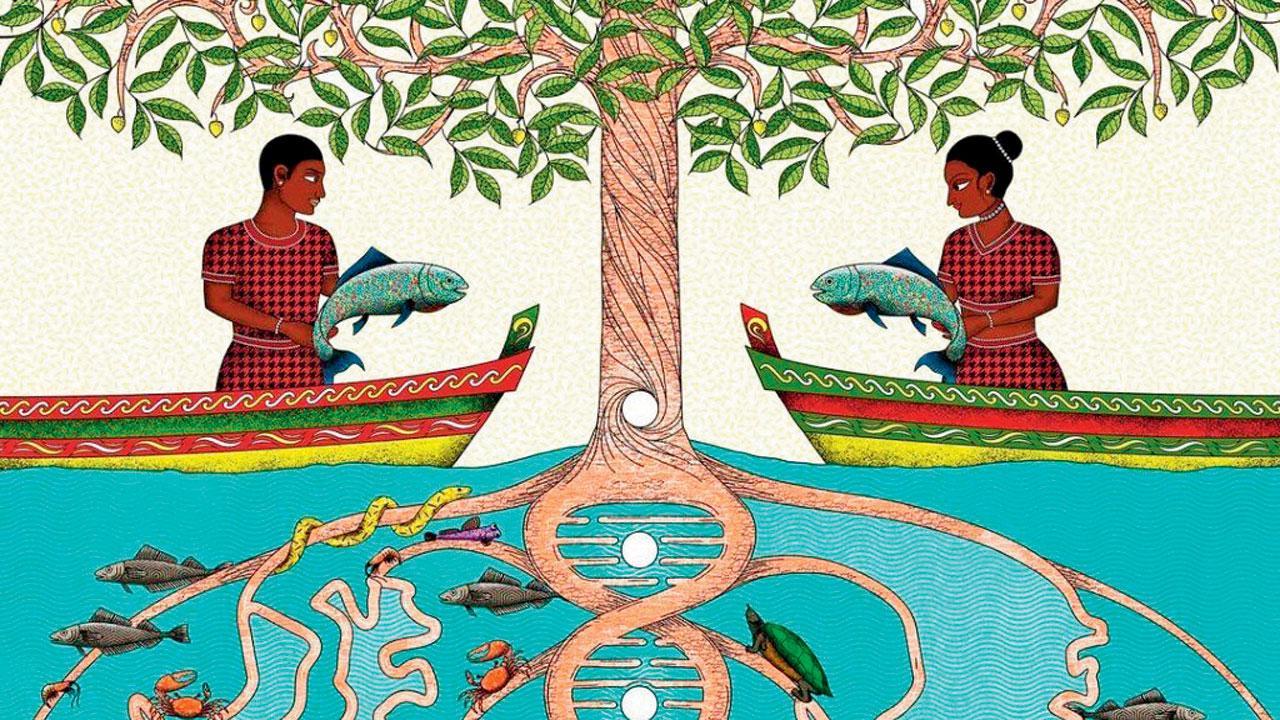Since April, young artists have picked up their brush to spread awareness about mangroves as part of a citizen-led campaign. Now, a virtual gallery of these artworks showcases diverse aspects of this vital ecosystem

Mumbai’s DNA by Gary Curzai depicts the way mangroves house a variety of flora and fauna and how the Kolis live harmoniously with this ecosystem
gWhile conducting their research on the city’s rich biodiversity, the community platform Ministry of Mumbai’s Magic had realised that there were two aspects to the protection of mangroves. One, countless citizens don’t realise the critical value of mangroves and wetlands, which results in garbage-dumping and encroachment, and two, many aren’t aware about how to take action, shares campaign lead Arpita Bhagat.
ADVERTISEMENT
A comic strip by Aditi Mali on the importance of mangroves
Recognising that art has a way of speaking to people, weaving in a sense of belonging and inspiring action, they decided to launch an arts-based campaign on Earth Day (April 22) to help protect mangroves, which not only act as the skin of our coasts, but also house a variety of species and are essential for the survival of several communities.
A crochet work by Rekha Vishwas Lele
Through #MakeArtforMumbaisMangroves, they invited artists to raise awareness about this natural sponge, which is under threat amid rapid urbanisation. Since April, creative lead Suma Balaram shares they’ve received over 100 entries from across the country, engaging over 2.6 lakh people. Launched last week, a virtual gallery now displays these artworks.
An embroidered piece by Koshy Brahmatraj inspired by the artist’s memories of stories about how flamingoes used to visit Lokhandwala, and his classroom window’s view of Malad creek and Versova mangroves. Pics/The Artists and Ministry of Mumbai’s Magic
From typographical experiments, crocheting and embroidery work to paintings, graphic designs and comic strips, the submissions were diverse in form and themes. “While some creators such as Nitasha Nambiar and Mrinmayi Dalvi focussed on how mangroves act as natural buffers against coastal erosion and flooding, others like Tanya Timble and Khyati Patkar painted a picture of them as the thriving home to flora and fauna,” informs Balaram. Some artists like Gary Curzai illustrated how mangroves sustain livelihoods, for instance, the Kolis’. “A need for better urban planning to tackle the rise in sea levels was dramatically displayed by illustrators like Harmeet Rahal and Sid G,” she elaborates.
A typographic poster from Spot the M series by Samya Ghosh. Each silhouette depicts a species from Mumbai’s biodiversity
A zine featuring 50 artists will be presented to the state environment ministry by June end. Bhagat notes that their long-term vision is an inclusive, citizen-led movement to make Mumbai a climate-resilient city. To keep up the momentum, they’re working with various partners like Project Mumbai, with whom they’ve launched the Harita Fellowship.
Arpita Bhagat and Suma Balaram
“Fellows will get to work on improving public parks. Through a curated festival with Bombay61, we want to provide a platform for the Koli community to speak of their relationship with the city’s coastline. We’re in conversation with the Mangrove Foundation and arts and conservation organisations to showcase the artworks,” she reveals.
Log on to: ministryofmumbaismagic.com
Also Read: Mumbai cafes offering al fresco dining and welcoming guests now
 Subscribe today by clicking the link and stay updated with the latest news!" Click here!
Subscribe today by clicking the link and stay updated with the latest news!" Click here!






